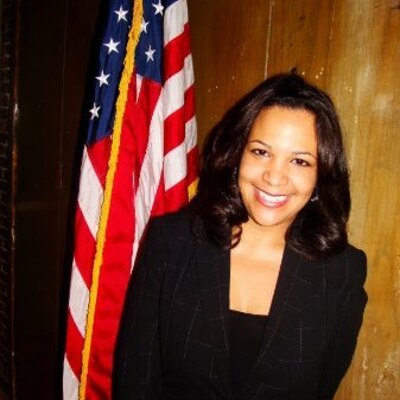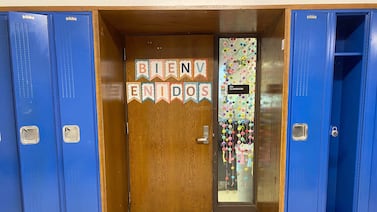The chancellor’s right-hand at the New York City education department is looking for a new gig.
Cheryl Watson-Harris was briefly one of more than 20 candidates vying to become superintendent of Sarasota County schools, which enrolls about 44,000 students on the west coast of Florida, according to a copy of her application that had been posted on the district’s website.
But she withdrew from the running Thursday afternoon, the Sarasota Herald-Tribune reported. A spokesperson for the New York City education department said Watson-Harris “is pursuing other opportunities, a process we understand to have begun in December.”
Florida has unusually broad public records laws, while New York City’s education department is notoriously difficult to pry documents from. Her resume, cover letter, and letters of recommendation had been posted online, alongside the other candidates.
Hours after receiving questions from Chalkbeat about her application, Watson-Harris withdrew from consideration, according to John Reichert, a consultant with the Florida School Boards Association who is helping to lead the superintendent search.
“That was just a personal choice,” Watson-Harris told the Herald-Tribune.

Watson-Harris currently serves as second-in-command of the country’s largest school system and led New York City’s transition to remote learning after the coronavirus outbreak, according to her May 17 cover letter. Chancellor Richard Carranza tapped her for a newly created first deputy chancellor position shortly after he took the reins in 2018. Watson-Harris has been responsible for overseeing the chancellor’s new approach to supporting and supervising schools.
Watson-Harris set her sights elsewhere as the city’s education department is facing enormous uncertainty brought on by the coronavirus, along with a looming budget crisis that will likely be felt for years to come. With school buildings shuttered for at least a third of the academic year, it is unclear when students will be able to return. Watson-Harris has been a key player in the department’s response to the outbreak.
In a statement provided through the education department before removing herself from the running in Sarasota, Watson-Harris said it was time to weigh her options.
“I’ve learned so much in my time here. As my daughter graduates high school and my son looks to begin high school in the fall, and as I evaluate personal and family obligations, this is a time for my family to make difficult decisions for our future,” she said. “If I were to accept a job elsewhere, I would do everything to make sure our 1.1 million NYC school children and my colleagues have the support they need for a successful transition.”
She did not respond to a Chalkbeat request for comment after withdrawing her interest in the Florida position.
Her application for the Florida job signals that a reshuffling at the education department might be on the horizon. In New York City, the mayor controls the school system, and Mayor Bill de Blasio is wrapping up his final term. In the short history of mayoral control, each new city leader has shaken up the leadership at Tweed, the education department’s central offices. That means many senior officials may be looking now for their next steps.
Aaron Pallas, department chair of education policy and analysis at Teachers College at Columbia University, said it’s likely that Watson-Harris is simply looking to take on her own leadership role.
“My sense is that she’s still well respected, that she’s managed the responsibilities that she’s had effectively. The [department of education] is sprawling, and complicated, and hard to manage — and there’s certainly not a perception that things are falling apart,” Pallas said.
But, he added, there’s no specific initiative identified with Watson-Harris “that people are clearly happy about.”
Her rise through the New York City ranks has been swift, moving quickly from being responsible for just one of the city’s school-support centers in Brooklyn, to supervising all seven. She had been rumored to be in the running to become chancellor after former schools chief Carmen Fariña retired.
In a recommendation letter for the Sarasota position, Carranza praised Watson-Harris for her ability to implement systems that keep individual students and schools in mind.
“She believes that change is possible, within our control, and a moral imperative,” he wrote. “These internal beliefs undergird everything she does.”
Watson-Harris described herself as “an equity-warrior, impactful leader, and champion for children” in her cover letter. She pointed to her management of nine executive superintendents, and a reorganization of how superintendents and borough-level school support offices work with each other as key accomplishments. Spearheaded by Carranza, those changes have raised eyebrows among some critics who say they have been expensive and the benefits of additional superintendents are unclear.
Although Carranza — and Watson-Harris — have embraced “advance equity now” as a mantra, there have been few dramatic policy changes under their leadership. The mayor, who sets the department’s agenda, has largely been content to stick with ideas he rolled out during his first term.
Watson-Harris has largely avoided controversy while in New York City — but not completely. Questions were raised about how her two children ended up in coveted schools after moving to the city in the summer of 2015. The city’s competitive application process typically makes it difficult for transfer students to snag seats at sought-after campuses. In a lawsuit filed by three white women claiming reverse discrimination by the education department, a former top official charged that she was leap-frogged by Watson-Harris for the first deputy chancellor position, even though Watson-Harris lacked the required license.
“The children in New York City — 70% of whom are black and brown children — get to see senior level administrators that look like them,” Carranza said when asked about the lawsuit. “And they happen to be extremely well-qualified individuals who at any moment could get tapped to lead their own school system anywhere across this country.”








